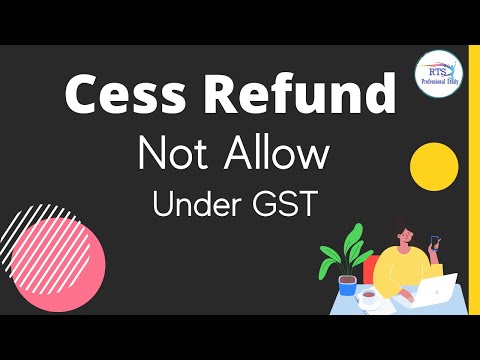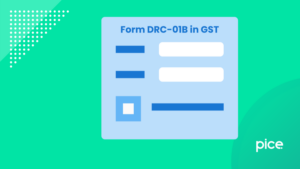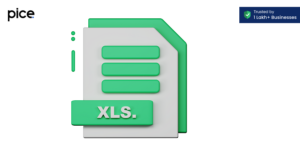Refund of Compensation Cess Under GST: An Overview
- 20 Feb 25
- 12 mins

Refund of Compensation Cess Under GST: An Overview
- What Is Cess in GST?
- Overview of Cess Under GST in India
- How Cess Is Calculated?
- When Is the Refund of GST Cess Applicable?
- Eligibility Criteria for GST Cess Refund
- How to Apply for GST Cess Refunds?
- Challenges and Considerations in Cess Refunds Under GST
- Legal Framework for Cess Refunds in GST
- Influence of GST Cess Refunds on Enterprises
- Relationship between GST Compensation Cess and Input Tax Credit
- Importance of Technology in GST Cess Refunds
- Conclusion
Key Takeaways
- Cess refunds under GST – Businesses can reclaim compensation cess on exports, misclassification, or overpayments.
- Eligibility criteria – Applies to exports, SEZ transactions, and inverted duty structures.
- Application process – Submit refund claims online with required documents via the GST portal.
- Challenges in refunds – Delays, strict documentation, and legal complexities can arise.
- Role of technology – Automated tax software simplifies calculations and refund processing.
Cess is an important part of the Goods and Services Tax (GST). It helps states make up for lost revenue after GST was introduced. Knowing how to get a refund is essential for businesses that export goods and services subject to this cess.
In this blog, we will explain the process of getting a refund of compensation cess under GST. We'll cover aspects such as the eligibility criteria and what documents you need. By understanding these key points, businesses can better manage GST compliance and improve their financial performance.
What Is Cess in GST?
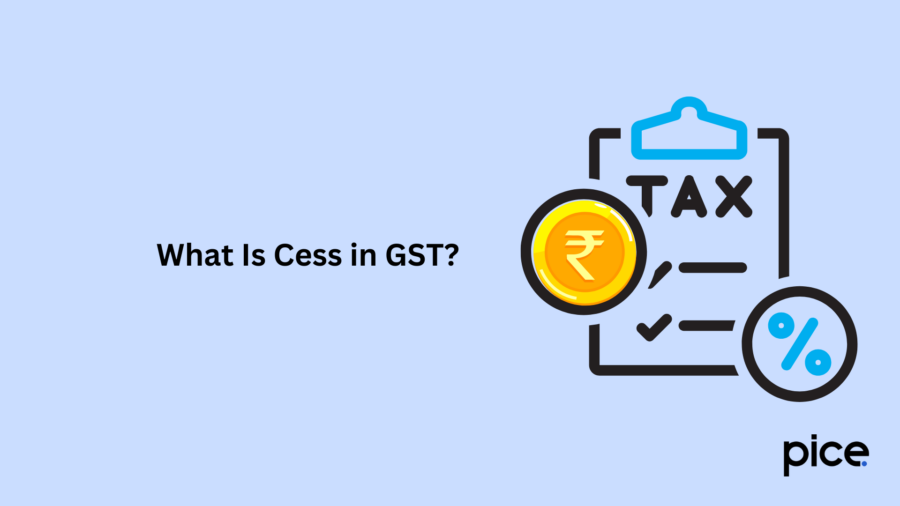
Cess is a tax applied to goods and services. The money collected is used for specific purposes, such as compensating states for lost revenue or funding particular initiatives. The cess rate isn't fixed; the GST council can recommend changes depending on the type of goods or services. For example, the GST compensation cess on solid fuels is ₹400 per tonne.
Overview of Cess Under GST in India
In India’s Goods and Services Tax (GST) framework, there are two primary types of cess imposed:
- Compensation Cess
It applies to certain goods and services, such as luxury products, motor vehicles and carbonated drinks. Its purpose is to offset potential revenue losses that states might face due to GST.
- Cess on Specific Goods and Services
It targets specific items and services to generate funds for various initiatives, including education, environmental conservation and infrastructure projects.
How Cess Is Calculated?
The cess amount is determined according to the assessable value of the goods or services. It includes the GST component. The cess rate is added to the GST rate. This increases the tax burden for consumers and businesses alike.
When Is the Refund of GST Cess Applicable?
Whether you can get a refund on a cess payment depends on several things. These include your specific business, the products or services involved and the circumstances under which you paid the cess. Generally, you are eligible for a refund if you overpaid or were incorrectly charged.
Eligibility Criteria for GST Cess Refund
Businesses may qualify for a cess refund in several typical situations:
- Exports
Companies engaged in exporting goods or services can reclaim the cess they have paid. That’s because this tax is intended for domestic consumption and does not apply to exports. For example, it could apply to the export of tobacco extracts.
- Inverted Duty Structure
If the cess incurred on inputs or input services is greater than the cess applicable to the final product or service, businesses can request a refund for the excess amount. It is possible if they meet the necessary criteria. Nil-rated and exempt supplies are not covered by this.
- Wrong Classification
When cess has been incorrectly paid due to a misclassification of goods or services, businesses are entitled to a refund for compensation cess. For example, if you have paid an incorrect GST compensation cess on motor vehicles due to wrong classification, you can get a refund.
Similarly, different tobacco products attract different cess charges depending on classification. On the other hand, tobacco extracts and tobacco substitutes attract different compensation cess. And again, water pipe smoking tobacco will attract a different GST compensation cess.
- Calculation Mistakes
Firms that have overpaid cess due to calculation errors or other inadvertent mistakes can submit an online application to recover the excess payment.
For example, filter cigarettes of different lengths have different GST cess charges. A business which has paid for a different length can get a refund of compensation cess.
- Overpayments
Businesses may also seek a refund of compensation cess for any excess payments made, regardless of the reason behind the overpayment. For example, you may have overpaid GST compensation cess for motor vehicles for an engine of higher capacity even though your engine capacity is lower.
Additional Categories for Cess Refund Eligibility
For specific types of cess, such as compensation funds, the following scenarios may qualify for refunds:
● Exports of goods or services
● Transactions involving Special Economic Zones (SEZs)
● Cases involving an inverted duty structure
● Refunds related to Input Tax Credit (ITC) due to business closure or certain other specific reasons
However, for other types of cess, the eligibility criteria for refund of compensation cess may differ. It will be determined by the central government's regulations and guidelines.
How to Apply for GST Cess Refunds?
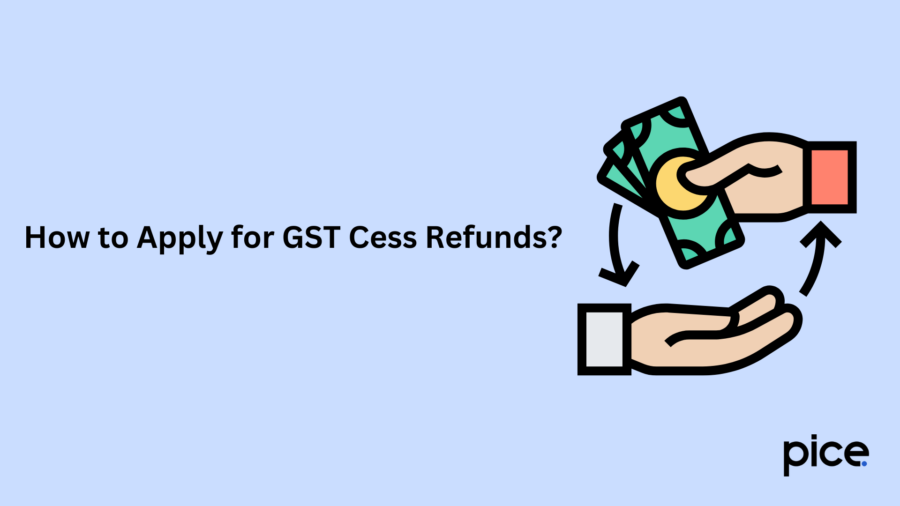
Obtaining a refund of compensation cess requires careful adherence to rules. Businesses need to follow the guidelines for submitting their cess refund applications. They must also provide the necessary documents to the tax authorities.
Here are the steps involved in applying for a GST cess refund:
- Document Preparation
Companies should collect and organise all essential supporting documents, including invoices, shipping bills and other important records.
- Application Submission
The refund application must be submitted via the GST portal. You must also submit all required documents. Depending on the situation, this can be done online or at a facilitation centre.
- Providing Additional Information (if needed)
During the review process, tax authorities may ask for more information or clarifications. Provide the necessary details as asked for.
- Acknowledgement and Processing
Once the application is received, tax authorities will acknowledge it and begin processing the compensation payable if everything is in order.
Refund Disbursement
Once your refund is approved, the central government will send the money back to you. This will usually be done either by directly depositing it into your bank account or by adding it as a credit to your electronic cash ledger.
It is essential to recognize that the refund process may involve scrutiny and verification, which could lead to delays depending on the complexity of the case and the current workload of the tax authorities.
Challenges and Considerations in Cess Refunds Under GST
GST has provisions for refunding the cess collected. But several businesses may face issues in actually getting the refunds. Typical challenges include strict documentation criteria and delays in processing the refund. Moreover, the law is written in such a manner that it can often be interpreted in multiple ways; this further leads to confusion.
Documentation Demands
A business needs to submit several documents to prove its point. They need to keep detailed records of all transactions and provide proof to validate their claims. Failing to do so leads to delays and rejections.
Interpretation Uncertainties
The complexity of GST laws can lead to uncertainties regarding interpreting certain provisions related to cess refunds. Since the provisions can be interpreted in so many ways, it naturally leads to confusion. This increases the chances of legal disputes; and cases can drag in courts for decades.
Processing Delays
Although there are established timelines for processing refunds, companies may still encounter delays. There are several factors which can lead to delays. This includes an increase in the work pressure on bureaucrats, and multiple rounds of vetting to ensure accuracy.
For businesses working on tight budgets and narrow margins, this can lead to a cash crunch. It can harm the business negatively.
Compliance Requirements
A business has to successfully comply with GST to be eligible for cess refunds. From maintaining records accurately to filing returns on time, there is so much to be done. Businesses need to stay up to date with all rules and guidelines. The cost of non-compliance can be rejection of cess refund application.
Legal Framework for Cess Refunds in GST
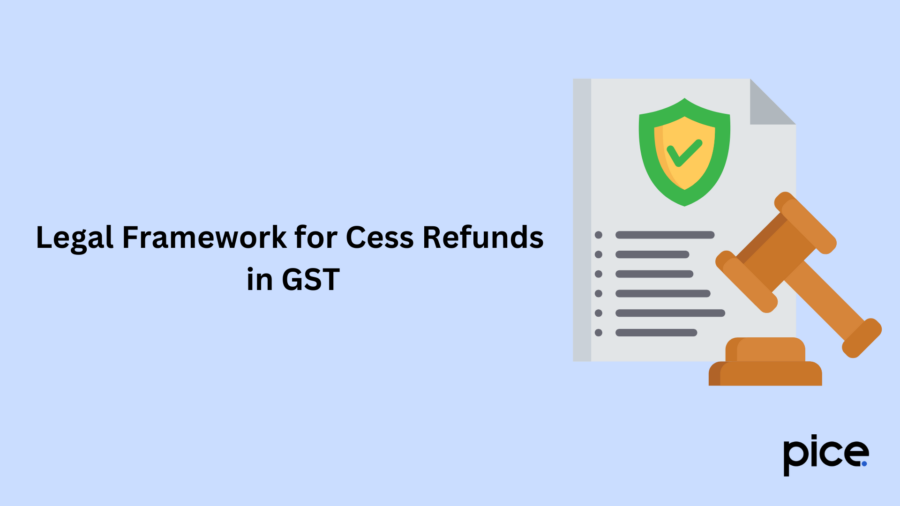
The system for cess refunds within the Goods and Services Tax (GST) is based on several laws, rules and regulations. These legal texts define who qualifies for a refund, how to apply, the timeframes involved and other important details.
Key GST Legislation and Regulations
Several key documents form the basis of cess refund procedures under GST:
● Central Goods and Services Tax Act of 2017 (CGST Act): This is the main law for GST, and it includes sections on refunds, base revenue, prescribed rate and cess.
● Integrated Goods and Services Tax Act of 2017 (IGST Act): This law covers tax revenue on goods and services moving between states and has sections on refunding cess paid on exports.
● GST Rules: The Central Goods and Services Tax Rules of 2017, along with state-specific GST rules, offer detailed instructions on how to claim refunds, including those for cess.
Important Legal Sections
Specific sections within these documents are particularly relevant:
● Section 54 of the CGST Act: It describes the process for claiming refunds, including cess refunds on goods or services exported from India.
● Section 96 of the CGST Act: This addresses refunds of cesses, such as the compensation cess, when goods or services are not subject to GST or have a zero GST rate.
● Rule 89 of the CGST Rules: It details the requirements and steps for claiming cess refunds on exported goods or services.
● Rule 92 of the CGST Rules: It provides instructions for claiming refunds of accumulated Input Tax Credit (ITC), including any cess portion, when a business closes or in other specific situations.
Because the legal framework for GST and cess refunds can change and be interpreted differently, businesses need to keep up with the latest updates and explanations from the relevant authorities.
Influence of GST Cess Refunds on Enterprises
Cess refunds under the GST system can substantially affect businesses' functions. Receiving these refunds promptly can free up capital, lessen financial strain and boost overall efficiency.
Managing Cash Flow
Managing cash flow is greatly aided by these refunds. Reclaiming overpaid cess releases funds that would otherwise be locked within the tax system. This provides crucial working capital that can be reinvested, used for day-to-day expenses or allocated to other business necessities.
Approach to Pricing
Cess refunds have an important impact on how a business prices its goods. This is especially true for businesses that have to export products and deal with inverted duty structures. For example, what happens if a business realises that it will get fewer amounts as refunds? In such a case, it can decide its prices accordingly. This will help it stay competitive.
Enhancing Operational Efficiency
Streamlined refund processes can also improve how efficiently businesses run. By simplifying applications and processing, companies can reduce administrative overhead and better allocate resources to their primary activities.
Strategic Choices
Finally, the possibility of getting cess refunds can influence various strategic choices, including export plans, supply chain organization and investment decisions. Businesses may consider potential refunds when assessing the feasibility of exporting or when restructuring their supply chains to minimise tax liabilities.
Relationship between GST Compensation Cess and Input Tax Credit
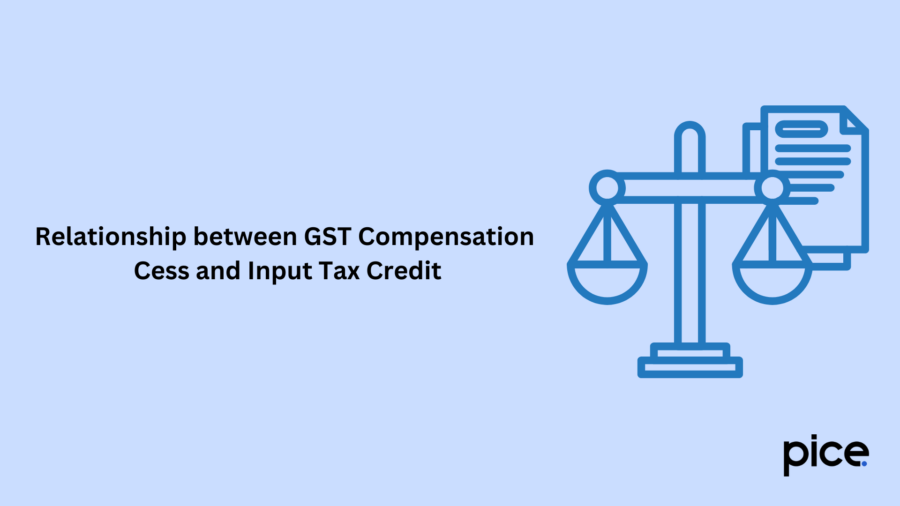
A business can take advantage of input tax credit (ITC) to minimise its GST obligations. This is achieved by deducting the tax paid on purchases (input tax) from the tax collected on sales (output tax), effectively reducing the overall GST burden.
Additionally, you are eligible to claim ITC on the GST cess paid for specific goods. It’s important to note that this ITC can solely be applied towards settling GST cess and cannot be used for CGST, SGST or IGST payments. Only the liability of compensation cess arising from outward supply can be waived off using ITC.
Importance of Technology in GST Cess Refunds
Technology plays a crucial role in claiming GST cess refunds. Here's how:
● Streamlined Calculation Automation: Software designed for tax management can automatically calculate the amount of cess you are owed. It ensures accuracy and minimises the chance of human error.
● Comprehensive Data Management and Insights: Tax management software keeps detailed records of all your refund-related information. It ensures you meet all compliance requirements. The data analysis features can also provide valuable insights into refund trends, identify areas for improvement and help with strategic planning.
● Connecting with Government Platforms: Connecting your business's systems directly to government platforms like the GST portal can make the refund process much smoother. This connection improves transparency, reduces the need for manual work and speeds up processing times. By enabling automatic data transfer, validations and real-time updates, many of the usual difficulties can be avoided.
Conclusion
For businesses, understanding how to get a refund of compensation cess under GST is essential. The GST system allows businesses to reclaim overpaid amounts, including the compensation cess. Knowing the requirements for eligibility, the necessary paperwork and the application process helps businesses successfully navigate the refund system.
💡If you want to streamline your payment and make GST payments via credit card, consider using the PICE App. Explore the PICE App today and take your business to new heights.







